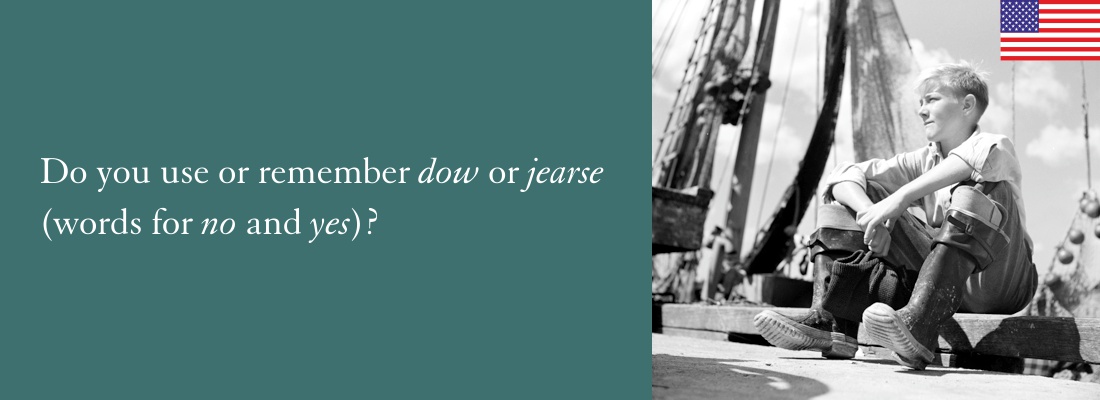
Please take the survey below
Do you use or remember “dow” or “jearse,” words for “no” and “yes”? If so, I would like to hear from you.
I am researching the words for “no” and “yes” in New England and other parts of the U.S. and Canada settled by people from New England. Ayuh is already quite well known, but colonists from the East of England may have brought “dow” and possibly “jearse” to New England in the seventeenth century. Four hundred years later, this distinctive feature of Eastern English – emphatic words for “no” or “yes” – still survives in England and America today.
Gerald E. Lewis gives an example of “daow” in How to Talk Yankee:
“Did you get your deer yet?”
“Daow, I can’t even see one.”
And John Gould, author of Maine Lingo, tells the apocryphal story of some Maine lobstermen in federal court for price fixing. Washington lawyers asked a witness a foolish question, to which the witness replied, “Daow!” The court recessed so that the lawyers could find out what “daow” meant, and how to spell it.
In the East of England, where I grew up, we still use “dow” and “jearse” today. However, they are not recorded in the Oxford English Dictionary or the Survey of English Dialects. Nor were they recorded by the Linguistic Atlas of New England; but the Dictionary of American Regional English cites daow, daowd, or dow in Massachusetts, Vermont, Maine, and possibly New York State. There is also day-oh in Rhode Island and daow in New Hampshire. For “jearse,” there is jyes and djess in parts of New England and jass in Upstate New York.
The aim of my research is to find out how widespread “dow” and “jearse” are in England and the U.S., how people use them, their etymology, and how they came to America.
I was recently a guest on BBC Radio, talking about “jearse” and “dow” in Eastern England. And last spring I gave a talk on “jearse” and “dow” at Cambridge University. To read about my research on BBC.com, click here. To read about the connections between the East of England and New England, and why New England might preserve the speech of the Eastern England from 400 years ago, see below on this page.
As a result of the BBC Radio survey, I have found that today “jearse” and “dow” are used or remembered across the East of England, in Cambridgeshire, Norfolk, Suffolk, Huntingdonshire, Essex and Lincolnshire.
I am writing a book chapter on “jearse” and “dow” to be published next year and would like to hear from you about “dow” and “jearse” in America.
The Dow Jearse Survey in the media
BBC.com, Stephen Howe’s mission from Japan: Is that a ‘jearse’ or a ‘dow’?, 20 August 2015.
BBC Radio Suffolk, Studio guest on the Lesley Dolphin Show, 17 August 2015.
BBC Radio Cambridgeshire, Interview on Sue Dougan Lunchtime Live, 29 July 2015.
BBC Radio Norfolk, Studio guest on the Nicky Price Breakfast Show, 19 August 2015.
BBC Radio Lincolnshire, Studio guest on Melvyn in the Morning, 21 August 2015.
Cambridge News, ‘Do you speak Ely? If “jearse”, he wants to hear from you…’, January/February 2015.
Fukuoka University News, 人文学部英語学科スティーブン・ハウ准教授が英国のBBCラジオに出演, website in Japanese, 31 August 2015.
Eastern Daily Press, ‘Yes or no…help us shed light on two little words’, column by Peter Trudgill, 7 September 2015.
Please take the survey below
If there is any problem with this form, please use this page instead
The East of England and New England
My maternal grandmother, from a small village in East Anglia, spoke in a way that to me as a child sounded very American. I later learned that it is the other way round – that Americans, especially from New England, sound a lot like my grandmother. I am interested in the English that my grandparents spoke, and its links to the English of New England. I teach English Language and Linguistics at a university in Japan but was born and grew up in the Isle of Ely in Cambridgeshire. If you drive from my home town in the Isle of Ely to Lincoln, two hours north, you pass Cambridge, Stamford and Boston, and many more places with U.S. resonance.
Almost four hundred years ago, many people from Eastern England settled in New England. Brandeis Professor David H. Fischer writes in Albion’s Seed: Four British Folkways in America: “From 1629 to 1775, the present area of the United States was settled by at least four large waves of English-speaking immigrants. The first was an exodus of Puritans from the east of England to Massachusetts during a period of eleven years from 1629 to 1640.” He adds, “one region in particular accounted for a majority of the founders of Massachusetts. It lay in the east of England.” Approximately 60 percent of emigrants to Massachusetts came from Norfolk, Suffolk, Essex, Hertfordshire, Cambridgeshire, Huntingdonshire, Lincolnshire, Bedfordshire and Kent.
Fischer writes that led by the Arbella, “The seventeen vessels that sailed to Massachusetts in 1630 were the vanguard of nearly 200 ships altogether … This exodus continued from 1630 to the year 1641 … After the year 1640, New England’s great migration ended as abruptly as it began … Migration to New England did not resume on a large scale for many years – not until Irish Catholics began to arrive nearly two centuries later.”
New England migrants and their descendants spread out from Massachusetts to southern New England, eastern New Jersey and northern New York, later migrating east and north to Maine and Canada, and west to the Pacific. Cities founded by settlers from New England include Buffalo, Cleveland, Chicago, Denver, Seattle and San Francisco.¹ If you are from those cities, do you use or remember “dow” and “jearse”?
Why might New England preserve the speech of the East of England from 400 years ago?
A great many of the migrants to New England were families rather than single men. And a higher proportion of women migrated to New England than to other colonies.¹ This means that children growing up in New England learned the language of their mother and father who, in many families, spoke Eastern English. The short, great migration of many people from the East of England, followed by a period of almost two centuries with no large-scale immigration, means that New England could preserve features of Eastern speech, one of which is probably “dow” and, perhaps, “jearse.”
There was also considerable contact between old and New England. David Cressy, emeritus professor of history at Ohio State University, writes in Coming Over: Migration and Communication between England and New England in the Seventeenth Century: “In place-names, in law and custom, in memory, and in the partial replication of the home society, old England was ever present. Through politics, religion and trade, as well as family relationships and the vagaries of inheritance, the homeland continued to beckon … [New England settlers] continued to receive news, handle business, and sustain contacts across three thousand miles of water.”²
Not Homer Simpson’s doh!
Finally, English has surprisingly many words for “yes” and “no,” including the standard yes and no, regional or archaic yea, nay and aye, and colloquial yeah and nah. We can also say yep and nope, vocalise uh-huh and uh-uh, and gesture “yes” and “no” by nodding and shaking our heads.
However, Homer Simpson’s doh is not one of them! Doh! sounds a little like “dow,” but it has a different meaning. Homer’s doh means “How stupid”; East of England and New England “dow” mean emphatically “no.” And “jearse” is not jeez from “Jesus.” “Dow” and “jearse” are not curses, rather unique words for “no” and “yes.”

Publications, presentations and awards
Howe, Stephen (2015) ‘Emphatic yes and no in East Anglian dialect: jearse and dow’, Paper presented at the Second Southern Englishes Workshop, University of Cambridge, England, 23 March 2015.
This paper looked at emphatic yes and no in East Anglian dialect. In a variety of East Anglian English, non-emphatic forms for ‘yes’ and ‘no’ are, as in much of English, yeah and no. However, emphatic forms are jearse and dow. This East Anglian dialect thus has a four-form ‘yes’–‘no’ system, with yeah–jearse and no–dow. The paper examined the origins and use of jearse and dow, neither of which is recorded in the Oxford English Dictionary or the Survey of English Dialects. The author also compared other forms for ‘yes’ and ‘no’ in English, including the standard yes and informal yeah, non-emphatic un, and regional or archaic aye, yea and nay, as well earlier ‘yes’–‘no’ systems in English. The paper concluded by briefly reviewing ways of answering in the affirmative or negative in other languages.
Howe, Stephen (2015) ‘Are “yes” and “no” universal?’, Paper presented at the Language Variation and Change Research Forum, Fukuoka University, 30 May 2015.
Howe, Stephen (2015) ‘The origin and meaning of “yes” and “no”’, Invited talk, Fukuoka Linguistic Circle, Fukuoka University, Japan, 18 July 2015.
The starting point of this presentation was the forms for ‘yes’ and ‘no’ in my home dialect of East Anglian English. In this dialect, unemphatic forms for ‘yes’ and ‘no’ are, as in much of English, yeah and no. However, emphatic forms are jearse and dow; neither is recorded in the Oxford English Dictionary or the Survey of English Dialects. The paper suggested a possible origin of these forms. The presentation then examined the origin and meaning of ‘yes’ and ‘no’ particles in language more generally. It asked how languages express ‘yes’ and ‘no’, what ‘yes’ and ‘no’ stand for, and whether ‘yes’ and ‘no’ are universal. It also examined the well-known difference between English and Japanese and other languages in answering negative questions (such as Don’t you love me anymore?), where ‘yes’ in one language corresponds to ‘no’ in another. Finally, I discussed paralinguistic ‘yes’ and ‘no’ (as in English uh-huh, uh-uh, Japanese un, uun) and ‘yes’ and ‘no’ gestures, also asking whether these are universal. The presentation concluded by suggesting a possible origin of forms for ‘yes’ and ‘no’.
Howe, Stephen (2015) ‘The forms of “yes” and “no” in English: origin and development’, Paper presented at the 5th conference of the Japan Society for Historical Linguistics, Hokkai-Gakuen University, Sapporo, 20 December 2015.
Howe, Stephen (2016) ‘Eastern English in America: ‘dow’ and ‘jearse’ in New England’, Paper presented at the 3rd Southern Englishes Workshop, University College London, England, 19 February 2016.
Howe, Stephen (2017) ‘Aye–aey: An Anglo-Frisian parallel’, Amsterdamer Beiträge zur älteren Germanistik 77, Issue 1-2, June, pp. 210–242. Download preprint.
Howe, Stephen (2018) ‘Emphatic yes and no in Eastern English: jearse and dow’, in Southern English Varieties: Then and Now, ed. by Laura Wright, Berlin and Boston: de Gruyter Mouton (= Topics in English Linguistics, vol. 100, ed. by Elizabeth Closs Traugott and Bernd Kortmann), pp. 148–187.
Howe, Stephen (forthcoming 2019) ‘New old words for “yes” and “no” in English’, The Bulletin of the Central Research Institute, Fukuoka University, series A, vol. 19, no. 1, August.
Howe, Stephen (2019-22) Japan Society for the Promotion of Science, three-year grant to research ‘jearse’ and ‘dow’ in America and the origins of ‘yes’ and ‘no’ in human language (grant no. 19K00698)
References
1. David Hackett Fischer (1989) Albion’s Seed: Four British Folkways in America, New York/Oxford: Oxford University Press.
2. David Cressy (1987) Coming Over: Migration and Communication between England and New England in the Seventeenth Century, Cambridge/New York: Cambridge University Press.